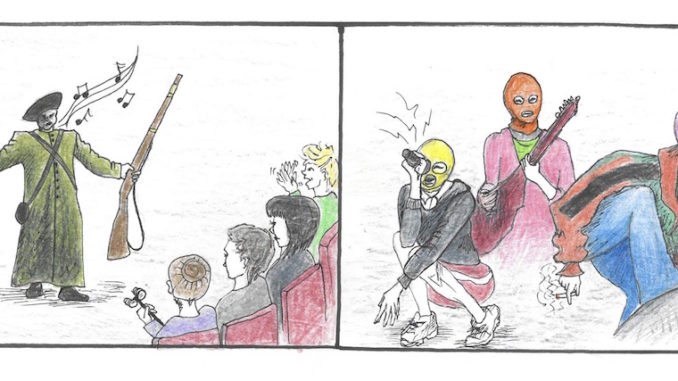
By Charlotte Powers
Professor Leah Goldman, a visiting assistant professor for E&D, gave a presentation discussing political statements in art in post-soviet Russia in her presentation “Operatic Agitation: The Crimean Annexation and the Politics of Performance in Post-Soviet Russia” on Tuesday Nov. 13. Goldman, a cultural historian of the Soviet Union, argued how Soviet ideals play a political role in the arts of modern day Russia despite it being 30 years after the collapse of the Soviet Union. To narrow her thesis, Goldman analyzed Lurri Alexandrov’s opera, Opera-Political Meeting Crimea, which conveyed how Crimea had and will always belong to Russia, a controversial argument to be made after the annexation of Crimea in 2014.
In addition, Goldman examined Russian feminist punk rock group, Pussy Riot, and the modern technological tools they utilized in critiquing Vladimir Putin and Russia’s government. When examining the opera and Pussy Riot performances side by side, Goldman argued that Alexandrov’s piece, unlike Pussy Riot, fails to adapt to the expectations of 21st century performance.
“The opera fails to meet the audience because it is live agitational theatre that has not been mechanized to 21st century technological aesthetics,” Goldman said.
She concludes by stating how these groups used different performance outlets to convey their contrasting attitudes toward Russian government but they both expressed their respective messages through art and performance.
Goldman knew to examine Russian art and performance as an expression of political opinion as it had been a key marker in her previous research.
“The Soviets believed that the arts and culture were a great way to shape citizens mentality and help them become new soviet men and women in the new socialist world,” Goldman said. “While using the arts for political gain is still an idea that has legs in that region of the world, the audience and its expectations have changed and therefore the media needs to change as well.”
When asked about the significance and relevance of her presentation, Goldman emphasized how studying history and the present through a cultural lens offers unique insight that other lenses cannot provide.
“We often tend to think of culture as a secondary feature to structure,” Goldman said. “Culture uses the imagination and it speaks in a different language than politics, and that is important to look at especially when we are trying to get a well-rounded picture of any society.”
Associate Professor of History and Department Chair, Andrew Bernstein, further emphasized the importance of cultural lenses and expanded on the relationship between presentation and perception.
“I think the presentation reinforced how important it is to focus not only on the ideological messages conveyed by certain art forms but also on the ways in which audiences receive, or fail to receive, those messages,” Bernstein said over email. “Historians need to take performance and art seriously when studying any time and place because they vividly demonstrate the values of those who produce them.”
Historians recognize the value of examining current consequences that are a result of the past, and Professor Reiko Hillyer, an assistant professor of History, contributed to this rationale.
“I really appreciated, as a scholar of memory, Leah’s attention to the re-interpretation and re-working of the opera over time,” Hillyer wrote over email. “Popular culture is instrumental in how we understand history and shape ideology, but it often gains its legitimacy through (selective) uses of the past. The presentation was a great combination of both exploring the uses of memory to affect the present as well as the potentially increasing obsolescence of certain forms of communication in the age of the internet.”
Subscribe to the Mossy Log Newsletter
Stay up to date with the goings-on at Lewis & Clark! Get the top stories or your favorite section delivered to your inbox whenever we release a new issue.

Leave a Reply